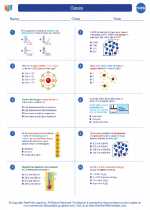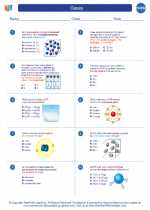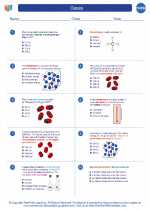Rotation in Chemistry
In chemistry, rotation refers to the movement of a molecule around a central bond or axis. This movement is important in understanding the physical properties and reactivity of molecules.
Types of Rotation
There are two main types of rotation in chemistry:
- Internal Rotation: This type of rotation occurs around single bonds in a molecule. The ability of a molecule to rotate around its single bonds affects its conformation and influences its physical and chemical properties.
- External Rotation: External rotation involves the movement of an entire molecule or group of molecules around a specific axis. This type of rotation is often observed in the context of chemical reactions and molecular dynamics.
Significance of Rotation
Understanding rotation is crucial for predicting and explaining the behavior of molecules. Some key points to consider include:
- The ability of a molecule to rotate around its single bonds affects its stability and energy levels.
- Conformations resulting from rotation can impact a molecule's reactivity and interactions with other molecules.
- Rotational motion influences the spectroscopic properties of molecules, such as their rotational spectra in spectroscopy.
Study Guide
To master the concept of rotation in chemistry, consider the following study guide:
- Understand the difference between internal and external rotation, and be able to identify examples of each.
- Learn about the factors that influence the ease or difficulty of rotation around a single bond, such as steric hindrance and bond strength.
- Explore the connection between rotation and chemical reactivity, and how different conformations can affect a molecule's behavior in reactions.
- Study the spectroscopic implications of rotation, including how rotational motion leads to specific features in a molecule's spectra.
- Practice with molecular modeling software or physical models to visualize and manipulate the rotational behavior of molecules.
By mastering the concept of rotation in chemistry, you'll gain a deeper understanding of molecular behavior and be better equipped to analyze and predict the properties and reactivity of various compounds.
[Rotation] Related Worksheets and Study Guides:
.◂Chemistry Worksheets and Study Guides High School. Gases
The resources above cover the following skills:
Physical Science
Energy - A. Energy is involved in all physical and chemical processes. It is conserved, and can be transformed from one form to another and into work. At the atomic and nuclear levels energy is not continuous but exists in discrete amounts. Energy and mass are related through Einstein's equation E=mc 2 . B. The properties of atomic nuclei are responsible for energy-related phenomena such as radioactivity, fission and fusion. C. Changes in entropy and energy that accompany chemical reactions influence reaction paths. Chemical reactions result in the release or absorption of energy. D. The theory of electromagnetism explains that electricity and magnetism are closely related. Electric charges are the source of electric fields. Moving charges generate magnetic fields. E. Waves are the propagation of a disturbance. They transport energy and momentum but do not transport matter.
Relate temperature to the average molecular kinetic energy.



